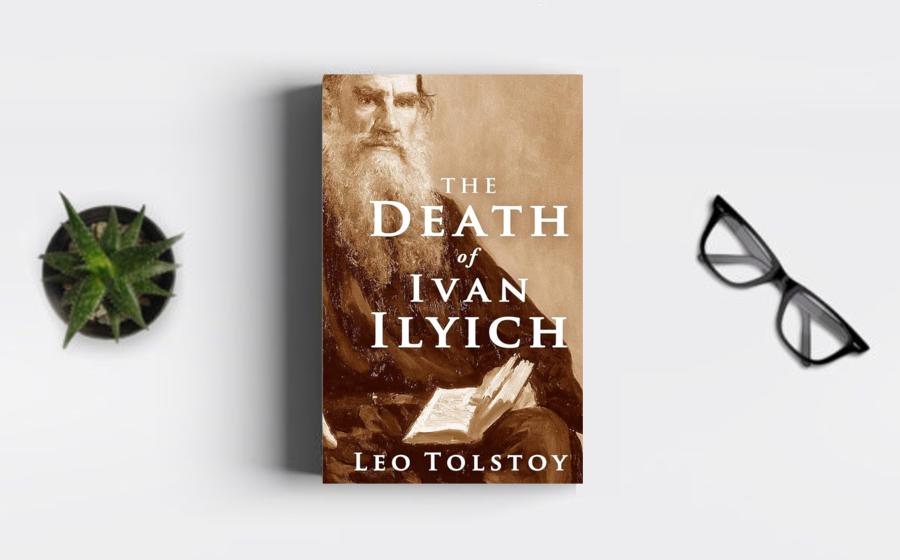"The Death of Ivan Ilyich," published in 1886, stands
as a philosophical masterpiece that offers profound
reflections on the nature of life, the inevitability of
death, and the quest for authenticity. Through the
poignant narrative of Ivan Ilyich Golovin, a
high-ranking judge in 19th-century Russia, Tolstoy
explores the complexities of human existence, the
pursuit of societal expectations, and the transformative
power of confronting mortality. In this meditation on
life and death, Tolstoy prompts readers to examine their
own lives, question societal norms, and seek the
authenticity that comes with acknowledging the finite
nature of existence.
The novella begins with the
news of Ivan Ilyich's death, setting the tone for a
reflective exploration of his life. The narrative
unfolds as a retrospective examination of Ivan's
experiences, relationships, and the gradual realization
of his mortality. This structure allows Tolstoy to delve
into the internal struggles of the protagonist, inviting
readers to accompany Ivan on his introspective journey
towards the ultimate confrontation with death.
At
the outset, Ivan Ilyich is portrayed as a man who
conforms to societal expectations, pursuing a
conventional path of success, marriage, and social
standing. Tolstoy presents him as a symbol of the
everyman, emblematic of those who prioritize external
achievements over inner fulfillment. Ivan's life is
characterized by a superficial pursuit of social
respectability, devoid of genuine passion or
self-awareness. Through Ivan's experiences, Tolstoy
challenges readers to reflect on the consequences of a
life lived according to societal norms, highlighting the
potential emptiness that can accompany a pursuit of
success devoid of personal meaning.
The pivotal
moment in Ivan's life occurs when he is diagnosed with a
terminal illness. This event becomes the catalyst for a
profound existential crisis, forcing Ivan to confront
the stark reality of his mortality. As Ivan grapples
with the inevitability of death, Tolstoy presents
readers with a mirror to examine their own lives. The
novella prompts a contemplation of the choices made, the
authenticity of one's pursuits, and the significance of
personal fulfillment in the face of mortality.
Ivan's journey toward authenticity involves a gradual
unraveling of societal illusions and a reevaluation of
his own values. The pain and suffering he experiences
become a crucible for self-discovery, prompting a shift
in perspective. Tolstoy suggests that the confrontation
with death has the power to strip away the layers of
pretense, revealing the true essence of one's existence.
In this, "The Death of Ivan Ilyich" becomes a poignant
meditation on the transformative potential of facing the
ultimate unknown.
The portrayal of Ivan's
relationships, particularly his marriage to Praskovya
Fedorovna, adds another layer to the novella's
reflections on life. The union, initially based on
societal expectations and appearances, becomes a source
of dissatisfaction and alienation for Ivan. Tolstoy
critiques the conventions of marriage that prioritize
social status over emotional fulfillment, prompting
readers to reconsider the authenticity of their own
relationships. Through Ivan's marital struggles, the
novella invites a broader contemplation of societal
structures that may impede genuine connections and
hinder the pursuit of a meaningful existence.
Tolstoy employs a narrative technique that oscillates
between the external observations of Ivan's
acquaintances and the internal monologue of the
protagonist. This duality serves to emphasize the
disconnection between societal perceptions of Ivan's
life and the internal turmoil he experiences. It also
allows readers to witness the stark contrast between the
facade of societal success and the internal reality of
existential questioning. The narrative structure becomes
a tool for Tolstoy to explore the dissonance between
societal expectations and the authentic journey toward
self-discovery.
The character of Gerasim, Ivan's
servant, plays a significant role in the novella as a
foil to the societal norms that govern Ivan's life.
Gerasim's authenticity, compassion, and willingness to
confront the reality of death stand in stark contrast to
the superficiality of Ivan's social circle. Gerasim
becomes a symbol of the genuine human connection that
transcends societal roles and expectations. Tolstoy uses
this character to underscore the importance of authentic
relationships and the potential for compassion in the
face of mortality.
The novella's conclusion, with
Ivan's spiritual epiphany moments before his death,
marks the culmination of his journey toward
authenticity. In acknowledging the inevitability of
death and embracing the love he denied himself
throughout his life, Ivan achieves a profound sense of
peace. Tolstoy suggests that true fulfillment comes not
from the external trappings of success but from an
internal alignment with one's genuine desires and the
acceptance of life's impermanence.
"The Death of
Ivan Ilyich" extends beyond the individual narrative to
become a broader reflection on the human condition.
Tolstoy prompts readers to contemplate their own lives,
urging them to reassess societal expectations, question
the pursuit of external validations, and seek the
authenticity that comes from acknowledging the transient
nature of existence. The novella serves as a timeless
meditation on the universal themes of life, death, and
the quest for meaning, resonating with readers across
cultures and epochs.
"The Death of Ivan Ilyich" by Leo Tolstoy stands as a profound exploration of life and death, inviting readers to confront their own existential questions. Through the introspective journey of Ivan Ilyich, Tolstoy prompts a contemplation of societal expectations, the pursuit of authenticity, and the transformative power of facing mortality.






